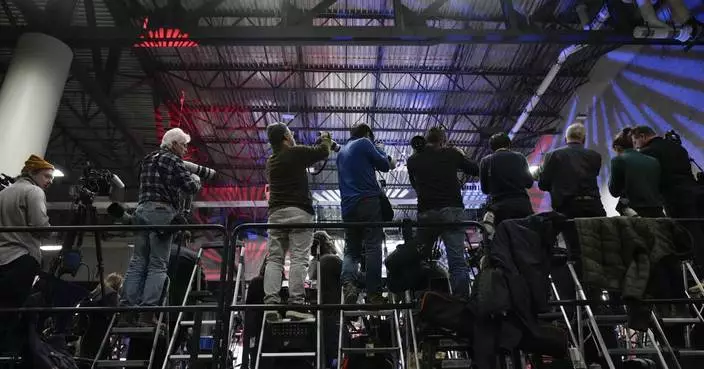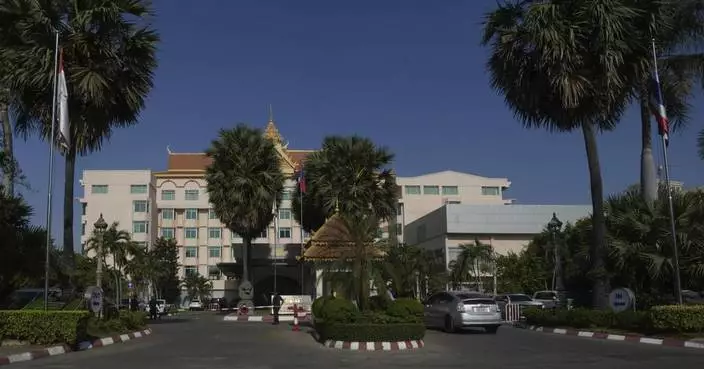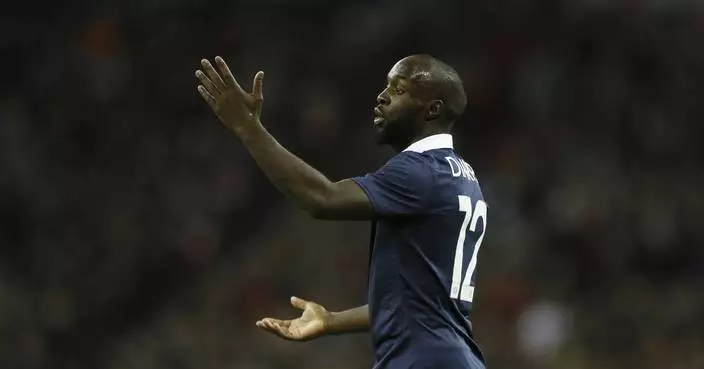In announcing Monday that he hopes to break the Brexit deadlock by next month, Prime Minister Boris Johnson is seeking to solve in a matter of weeks a puzzle that has troubled European and British specialists for more than two years.
Before negotiations on Britain's departure from the European Union even began in 2017, the vexing issue of how to keep goods flowing seamlessly between EU member Ireland and Northern Ireland when it leaves along with the rest of the U.K. — without time-consuming border checks — was identified as an obstacle that could derail the entire process.
A team of experts has focused solely on ways to tackle the conundrum. But with Britain set to depart on Oct. 31 and a costly no-deal withdrawal a possible outcome, even the experts do not appear to know exactly what will happen at the border on Brexit day. If they do know, they are not saying.
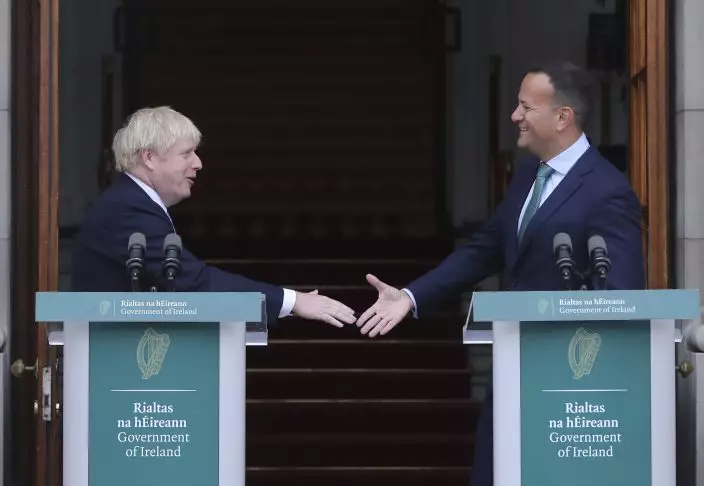
Britain's Prime Minister Boris Johnson, left, meets with Ireland's Prime Minister Leo Varadkar at Government Buildings in Dublin, Monday Sept. 9, 2019. Boris Johnson is to meet with Leo Varadkar in search of a compromise on the simmering Brexit crisis. (Niall CarsonPA via AP)
"The objective is to have all the checks and controls performed. How and exactly where they will be performed is something we are still working on," one of them responded when asked by The Associated Press whether vehicles would be stopped at the sinuous Irish land border on Nov. 1.
"There will be disruptions. Where they exactly will be beyond the island of Ireland is something I cannot tell you," the EU official said, speaking on condition of anonymity because of the sensitive nature of the ongoing Brexit talks.
It's not simply a technical issue about customs controls over goods, produce and livestock. The challenge of keeping trade and business running smoothly is deeply entangled with unique questions of identity: what it means to be from Northern Ireland, to have the right to Irish or British citizenship, or both.
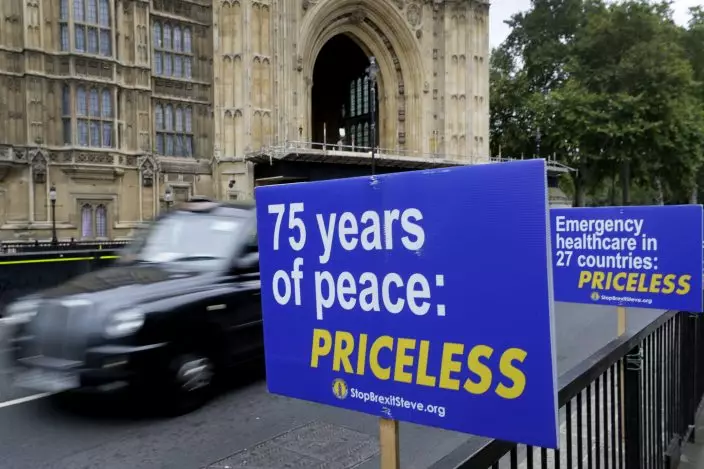
Anti-brexit banners are tied to railings opposite Parliament in London, Monday, Sept. 9, 2019. British Prime Minister Boris Johnson voiced optimism Monday that a new Brexit deal can be reached so Britain leaves the European Union by Oct. 31. (AP PhotoKirsty Wigglesworth)
Northern Ireland's Catholic and Protestant communities remain deeply divided two decades after a conflict that claimed around 3,700 lives. The peace agreement that ended 30 years of sectarian "troubles" helped bring the border down. The last thing people want is a return to those times.
It's the reason why Britain's 27 EU partners are insisting on the so-called "backstop:" a fail-safe guarantee to ensure that no hard border with customs outposts and infrastructure will be erected on Oct. 31.
"The backstop continues to be a critical component of the withdrawal agreement unless and until alternatives are found," Irish Prime Minister Leo Varadkar told Johnson on Monday. "We are open to alternatives but they must be realistic, legally binding and workable, and we haven't received such proposals to date."
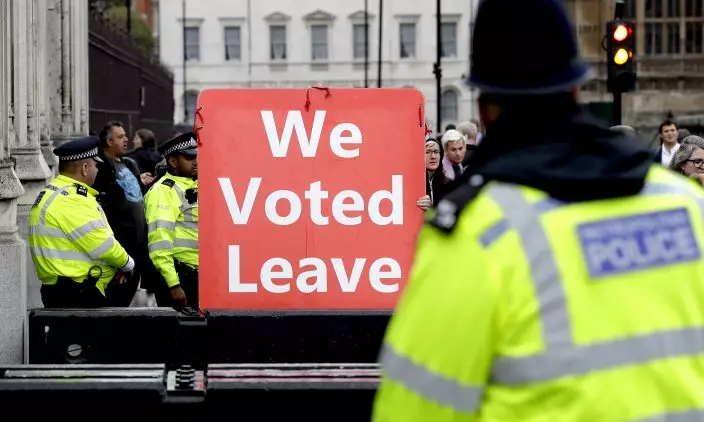
A pro-brexit campaigner holds a banner near Parliament in London, Monday, Sept. 9, 2019. British Prime Minister Boris Johnson voiced optimism Monday that a new Brexit deal can be reached so Britain leaves the European Union by Oct. 31. (AP PhotoKirsty Wigglesworth)
Beyond stressing that some delays might happen at unidentified points on the land border, Ireland's no-deal Brexit planning focuses on potential chokepoints at ports and airports, like those in Dublin and the Rosslare Europort. Additional warehouses, inspection bays, offices and parking facilities have been put in place, with increased capacity for document and food safety checks. Scores of new staff have been hired and temporary accommodation set up.
Lots of delays could be caused by animal and plant health controls. On average, commercial vehicles cross the Irish border 13,000 times a day. Of those movements, about 3,000 loads of beef, lamb, pork, poultry, eggs and dairy products would have to be stopped somewhere on their journey, with each check taking about 10 minutes to complete. That's if all goes well.
Beyond the technical considerations of daily trade and business, concern is mounting about smuggling; the illicit trade in fuel, alcohol and tobacco that could be super-charged by the difference in customs duties on either side of the border as well as the predicted fall in the British pound after Brexit.
At some point, police will have to tackle the problem, and it's likely they will be obliged to do so around the border.
"The people of this island — north and south — need to know that their livelihoods, their security and their sense of identity will not be put at risk as a consequence of Brexit. So the stakes are high," Varadkar said, before he and Johnson retired to discuss possible alternatives with only seven weeks to go.
BEIRUT (AP) — The European Union announced Thursday an aid package for Lebanon of 1 billion euros — about $1.06 billion — that will mostly go to boost border control to halt the flow of asylum seekers and migrants from the small, crisis-wracked country across the Mediterranean Sea to Cyprus and Italy.
The deal follows other EU aid packages for countries such as Egypt, Tunisia and Mauritania to fortify their borders. It comes against a backdrop of increasing hostility toward Syrian refugees in Lebanon and a major surge in irregular migration of Syrian refugees from Lebanon to Cyprus.
European Union Commission President Ursula von der Leyen said during a Beirut visit with Cypriot President Nikos Christodoulides that the aid distribution will start this year and last till 2027.
The bulk of the aid — 736 million euros — would go to support Syrian refugees “and other vulnerable groups” in Lebanon, while 200 million euros are meant to bolster Lebanese security services in enforcing border and migration control, according to figures provided by the Cypriot government.
An unspecified amount would go to Lebanese fishermen, to discourage them from selling their boats to smugglers.
Von der Leyen said the EU will also work on a “more structured approach to voluntary return" of Syrian refugees "in close cooperation with” the U.N. refugee agency. The bloc will continue to maintain “legal pathways” for resettlement of refugees in Europe, she said.
Lebanon's Caretaker Prime Minister Najib Mikati praised the package, saying that “Lebanon’s security is security for European countries and vice versa,” and that an escalation of the crisis ”will not be limited to Lebanon but will extend to Europe."
Lebanon, which has been in the throes of a severe financial crisis since 2019, hosts nearly 780,000 registered Syrian refugees and hundreds of thousands more who are unregistered, the world's highest refugee population per capita.
Lebanese political officials have for years urged the international community to resettle the refugees in other countries or assist their return to Syria — voluntarily or not. Lebanese security forces have stepped up deportations of Syrians over the past year.
Tensions further flared after an official with the Christian nationalist Lebanese Forces party, Pascal Suleiman, was killed last month in what military officials said was a botched carjacking by a Syrian gang. The incident prompted outbreaks of anti-Syrian violence by vigilante groups.
Meanwhile, Cypriot authorities complain the island nation has been overwhelmed by irregular migration of Syrian asylum seekers, many of them coming on boats from Lebanon.
The UNHCR in Lebanon said it had verified 59 “actual or attempted” departures by boats carrying a total of 3,191 passengers from Lebanon between January and mid-April, compared to three documented boat movements carrying 54 passengers in the same period last year. Usually, few boats attempt the much more dangerous crossing in the winter. In all of 2023, UNHCR recorded 65 boat departures carrying 3,927 passengers.
Cyprus has taken a new approach to halting the flow of migrants. Last month, it suspended processing of Syrian asylum applications, and human rights groups accused the Cypriot coast guard of forcibly turning back five boats carrying about 500 asylum seekers coming from Lebanon. Cypriot officials have denied this.
Bassel al-Shayoukh, a Syrian refugee from Idlib living in Lebanon since 2014, said his brother and several cousins and nephews were on one of the boats turned back. Now he wants to make the journey himself.
“In the beginning I thought that in a year or two the war would be over in Syria,” he said, but it dragged on, while in Lebanon “every year ... the situation began to get worse.”
Shayoukh said he fears being beaten by vigilantes or deported to Syria after Lebanese authorities declined to renew his residency permit.
His 17-year-old nephew, who declined to give his name fearing for his safety, said the Cypriot coast guard started making waves to push the boat he was on away. “I was terrified... I don’t know how to swim,” he said. “I thought we were going to die.”
The people on the boats “stayed three days without food or water” before turning back to Lebanon, the teen added.
Back in Lebanon, they were detained by the army; those registered with UNHCR were released and the others deported.
Mohammed Sablouh, a Lebanese human rights lawyer who works on refugee and migrant cases, says Lebanese authorities are deliberately “turning a blind eye" to the surge in migration to "pressure the international community.”
The Lebanese army did not respond to a request for comment on their measures to combat smuggling.
Thursday's aid announcement comes ahead of the annual fundraising conference for Syria in Brussels later this month. After 13 years of civil war, donor fatigue has set in while the world’s attention is occupied by the humanitarian fallout of more recent conflicts in Ukraine and Gaza.
The Cypriot president said Thursday was a “historic day” and called for European officials to go farther and declare some areas of Syria safe for return.
“The current situation is not sustainable for Lebanon. It is not sustainable for Cyprus, it is not sustainable for the European Union,” Christodoulides said.
But not all Lebanese officials are convinced the European aid would solve the problem.
Lebanese Forces party head Samir Geagea told The Associated Press earlier this week that European authorities are mainly concerned “that the refugees don’t go to Europe."
"For us the problem is that we cannot have our country drowning in illegal Syrian refugees,” Geagea said, urging for Syrians to be sent back to either government or opposition-held areas of the neighboring country.
But Shayoukh says he has nowhere to go.
The Damascus government wants him for opposing Syrian President Bashar Assad, he said, while the Islamist group that now controls his hometown behaves "the same way as the regime’s intelligence services” in crushing dissidents.
Associated Press writer Menelaos Hadjicostis in Nicosia, Cyprus, contributed to this report.
Follow AP’s global migration coverage at: https://apnews.com/hub/migration

Lebanese caretaker Prime Minister Najib Mikati, center, speaks during his meeting with Cyprus' President Nikos Christodoulides, left, and President of the European Commission Ursula von der Leyen at the government palace in Beirut, Lebanon, Thursday, May 2, 2024. (AP Photo/Hassan Ammar)
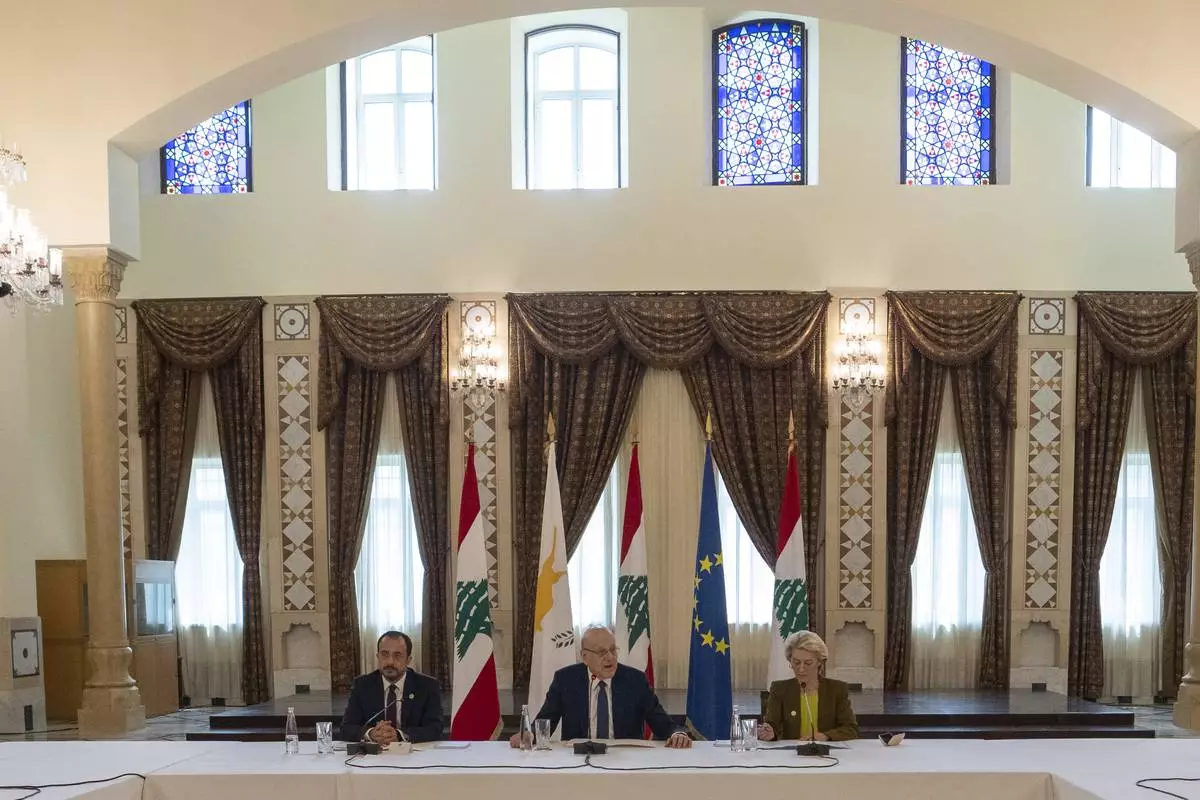
Lebanese caretaker Prime Minister Najib Mikati, center, speaks during his meeting with Cyprus' President Nikos Christodoulides, left, and President of the European Commission Ursula von der Leyen at the government palace in Beirut, Lebanon, Thursday, May 2, 2024. (AP Photo/Hassan Ammar)
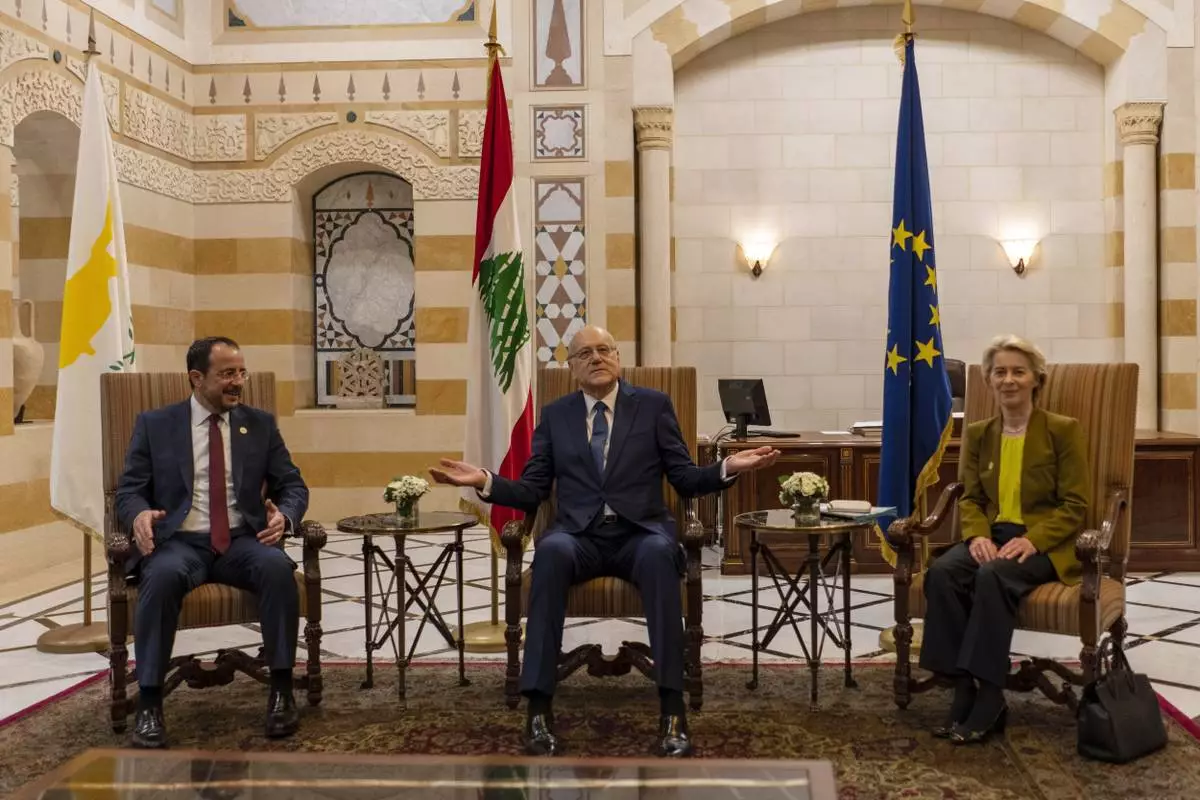
Lebanese caretaker Prime Minister Najib Mikati, center, welcomes Cyprus' president Nikos Christodoulides, left, and President of the European Commission Ursula von der Leyen before their meeting at the government palace in Beirut, Lebanon, Thursday, May 2, 2024. (AP Photo/Hassan Ammar)
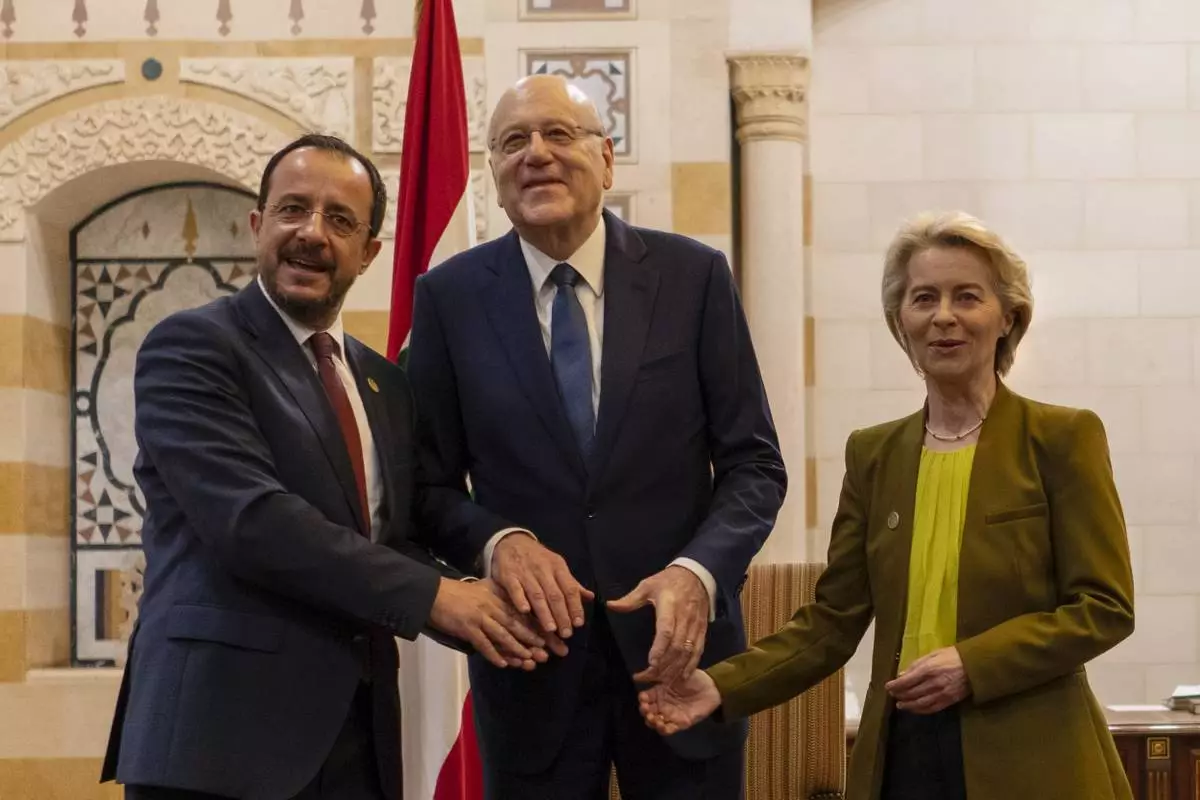
Lebanese caretaker Prime Minister Najib Mikati, center, Cyprus' President Nikos Christodoulides, left, and President of the European Commission Ursula von der Leyen pose for photograph at the government palace in Beirut, Lebanon, Thursday, May 2, 2024. (AP Photo/Hassan Ammar)
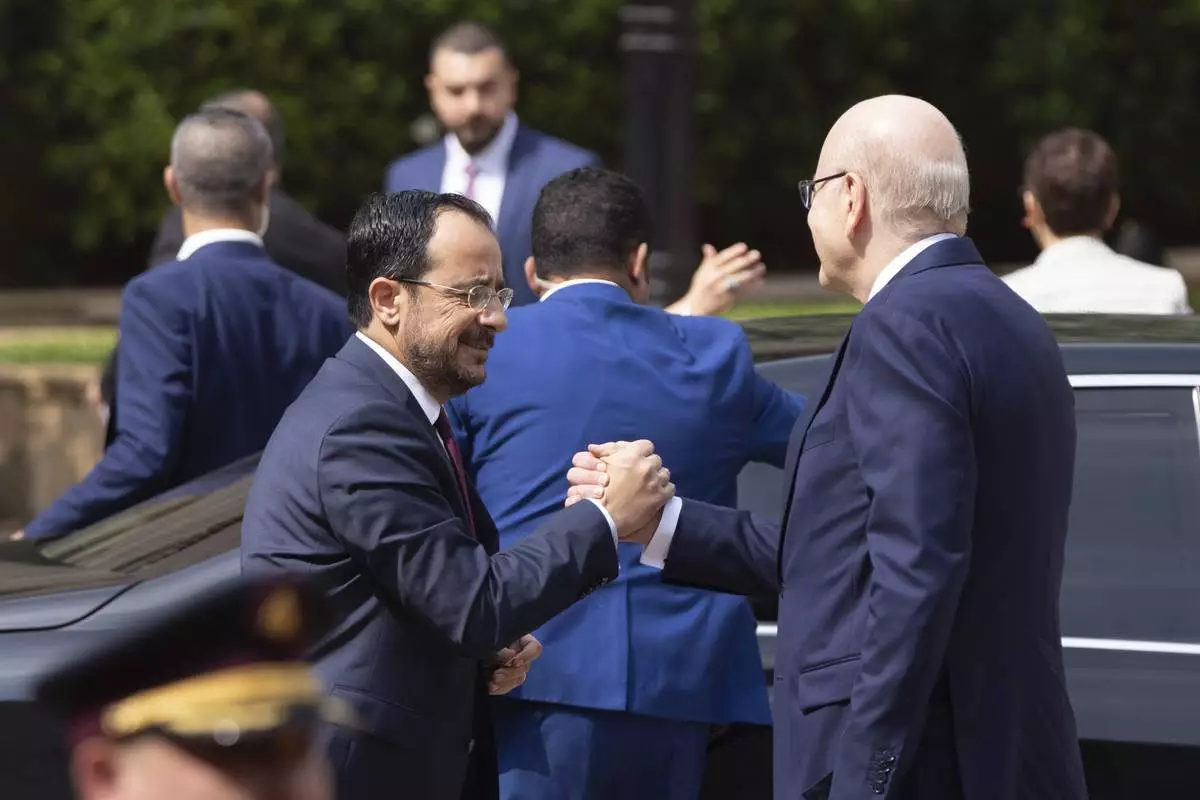
Lebanese caretaker Prime Minister Najib Mikati, right, welcomes Cyprus' president Nikos Christodoulides before their meeting at the government palace in Beirut, Lebanon, Thursday, May 2, 2024. (AP Photo/Hassan Ammar)

Cyprus' President Nikos Christodoulides, left, and President of the European Commission Ursula von der Leyen, center, review an honor guard upon their arrival to meet with the Lebanese Speaker Nabih Berri, in Beirut, Thursday, May 2, 2024. (AP Photo/Hussein Malla)

Lebanese caretaker Prime Minister Najib Mikati, center, speaks during his meeting with Cyprus' President Nikos Christodoulides, left, and President of the European Commission Ursula von der Leyen at the government palace in Beirut, Lebanon, Thursday, May 2, 2024. (AP Photo/Hassan Ammar)
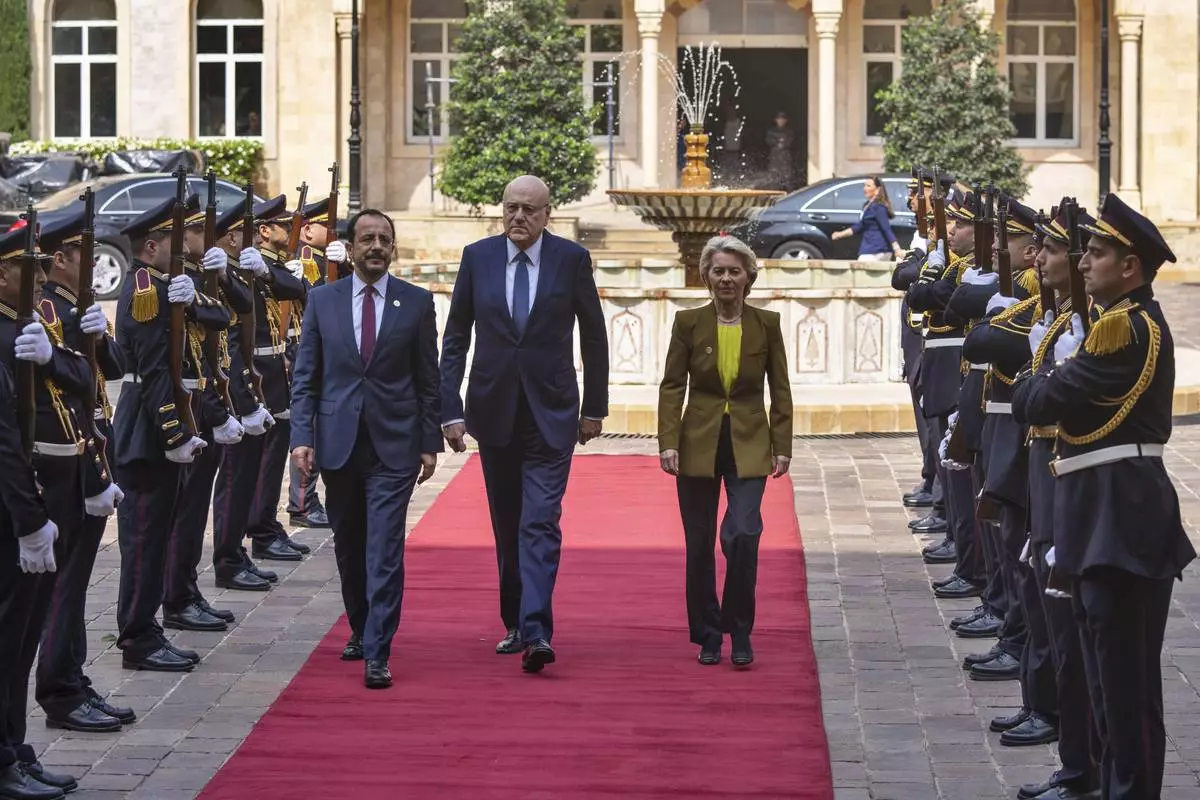
Lebanese caretaker Prime Minister Najib Mikati, center, welcomes Cyprus' President Nikos Christodoulides, left, and President of the European Commission Ursula von der Leyen at the government palace in Beirut, Lebanon, Thursday, May 2, 2024. (AP Photo/Hassan Ammar)














